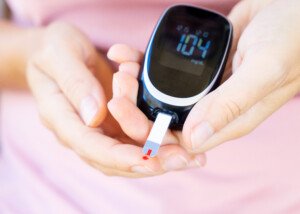
Wondering if insulin resistance can be caused by anxiety and emotional stress?
“Insulin resistance is when insulin is no longer able to trigger the same physiological response as it once did, or as is normal,” says Craig Stump, MD, former chief of the UA Division of Endocrinology, Diabetes and Metabolism (2006 to 2016), University of Arizona, Southern Arizona VA Healthcare System.
Insulin resistance is a forerunner to diabetes, says Dr. Stump.
If you clicked on this article, you probably already know some facts about insulin resistance, such as that “it requires more insulin to achieve the same effect as a lesser amount did under normal or insulin sensitive conditions,” continues Dr. Stump.
The primary causes of insulin resistance (or prediabetes) are lack of exercise; being overweight; and a diet with too many quick-acting carbohydrates (such as those found in any sugary foods, plus white rice, white bread and fruit juice).
Dr. Stump continues, “Stress can definitely cause insulin resistance and this is partly due to stress hormones including those produced by the adrenal gland.
“However, when I say this I am talking about severe stress such as severe injury, illness, surgery or deprivations.”
But what about stress of the psychological kind, such as the stress of daily living?

Can anxiety and stress be a cause, or even a contributing factor, to insulin resistance?
After all, stress increases production of certain hormones that, when left circulating and unopposed in the body, can be detrimental over time (e.g., high blood pressure, increased stroke risk).
“For example, anxiety may prolong the daily release of the stress hormone cortisol, which is predominantly released at dawn under normal conditions,” says Dr. Stump.
“Vigorous exercise likely opposes cortisol through a variety of mechanisms.
“Therefore, if you suffer from chronic stress while remaining sedentary, then slight but persistent cortisol elevations could contribute to metabolic dysregulation and deterioration of your health.”
Dr. Stump says he frequently hears about stress from his patients.
“They are forever blaming their lack of blood sugar control on increased stress.
” This is a much more difficult question which is fraught with potential abuse for excusing all sorts of unhealthy behavior, because if insulin resistance or poor glucose control can be blamed on ‘stress,’ then it is no longer the patient’s responsibility; it is due to outside influences beyond their control.
“This hypothesis also falters in that there are plenty of people with stress who are not insulin resistant.”
Even if anxiety and mental stress can outright cause prediabetes or insulin resistance, this does not absolve the patient from responsibility.
Because if you suffer from anxiety, this is all the more reason to ramp up physical activity.

Shutterstock/Jacob Lund
Bouts of intense physical exertion of a structured nature increase release of human growth hormone and testosterone (in ladies, too), and these potent fat-burning substances neutralize cortisol and another stress hormone, adrenaline.
And when you stick to an exercise program, you are more inspired to eat healthy foods and cut back on sugary foods.
So, with healthier eating and exercise adherence at play, what’s the invariable result?
Weight loss! With a healthier body and dramatically improved mood from exercise, you will sleep better, and sleep is very important for stabilizing blood sugar levels.
Dr. Stump explains, “The most notable and intriguing may be that relative sleep deprivation can cause insulin resistance.
“There have recently been preliminary studies suggesting that even one night of poor or inadequate sleep can make one more insulin resistant.
“On the other hand, exercise is definitely a physiological stressor that is well-known to improve insulin sensitivity.
“Whereas, remaining sedentary would not be considered ‘stressful,’ yet this is a primary cause of insulin resistance.”
In conclusion, no matter how much stress you have in your life…I’m going to be simplistic with this…but…hit the gym.
Anybody who engages in bouts of intense exercise will tell you that this does wonders for a harried, stressed-out soul.
Don’t fight anxiety and stress by overeating or filling up on sugary sodas, ice cream, cakes and cookies — which can lead to prediabetes or insulin resistance.
Dr. Stump’s research interests included insulin resistance resulting from physical inactivity, obesity and the metabolic syndrome, and identifying biological markers to predict progression of diabetes. Dr. Stump passed away in May 2019 after a brief illness.
research interests included insulin resistance resulting from physical inactivity, obesity and the metabolic syndrome, and identifying biological markers to predict progression of diabetes. Dr. Stump passed away in May 2019 after a brief illness.
 Lorra Garrick has been covering medical, fitness and cybersecurity topics for many years, having written thousands of articles for print magazines and websites, including as a ghostwriter. She’s also a former ACE-certified personal trainer.
Lorra Garrick has been covering medical, fitness and cybersecurity topics for many years, having written thousands of articles for print magazines and websites, including as a ghostwriter. She’s also a former ACE-certified personal trainer.
.









































